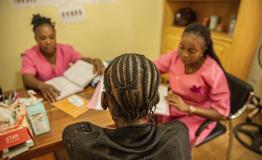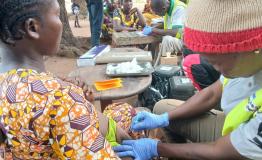

Central African Republic
MSF sees the direct consequences of violence on the health of the individuals and entire communities we serve. Wounded people needing care. Children unable to reach medical facilities during malaria season. The interruption of vaccination coverage and treatment for HIV and tuberculosis (TB). Women left without assistance before, during and after giving birth.
Our activities in 2021 in Central African Republic
Data and information from the International Activity Report 2021.

3,049
3,049
€70 M
7M
1997
1997
Around 1.5 million Central Africans were internally displaced or refugees in neighbouring countries following the resurgence of the hostilities in the country, marking the highest number since the peak of the conflict in 2013-14. Widespread violence has placed increased pressure on the fragile healthcare system, making it even harder for people with chronic diseases or needing specialised care to obtain treatment.
The year started with clashes between government forces and a coalition of armed opposition groups formed in December 2020, ahead of the elections that ratified Faustin-Archange Touadéra as president. Rapidly, violence swept over the country and continued throughout the year. Civilians were frequently caught in the middle; injured, forced from their homes and cut off from healthcare. In the context of a state-of-emergency already affecting the provision of care, the high level of insecurity and the increasing presence of foreign armed groups made it extremely difficult for Médecins Sans Frontières (MSF) and other humanitarian organisations to deliver assistance where it was needed, particularly in remote rural areas where the situation remained volatile.
While this overall situation affected our capacity to provide care, we continued to run 13 basic and specialist healthcare projects, focusing on maternal and child health, surgery, sexual violence, treatment for HIV and tuberculosis (TB), and responded to outbreaks of disease. We also ran various emergency responses and assisted people affected by conflict, treating a total of 390 war-wounded patients between mid-December 2020 and mid-March 2021.
In Bangassou, where we support the Regional University Hospital, more than 1,000 people arrived in search of shelter following attacks by armed groups in January. Another 10,000 fled across the Mbomou river into Ndu, in the Democratic Republic of Congo, where we increased our support to the local health centre and installed water purification systems.
In the same month, 8,000 people were displaced when the densely populated town of Bouar became the scene of intense fighting. MSF provided basic healthcare, as well as water and sanitation services, to people who had taken refuge in a cathedral and five makeshift displacement camps.
The warring parties did not spare medical or humanitarian workers. Our teams witnessed dozens of health facilities being ransacked, damaged and occupied, and patients subjected to violence, physical abuse, interrogation and arrest during armed incursions into hospitals. Community health workers in rural areas were also threatened and assaulted.
In early June, a camp hosting around 8,500 internally displaced people on the outskirts of Bambari was burned to the ground and an MSF malaria treatment point in the camp was destroyed. Days later, a patient’s carer was killed and three other people wounded when an MSF motorbike referral on its way to Batangafo came under attack.
The increasing presence of landmines and improvised explosive devices further hampered access to health facilities, for both staff and patients, in areas such as Bocaranga. In the last quarter of 2021, our emergency team ran an intervention there, assisting victims of sexual violence, administering vaccinations for measles, diphtheria, tetanus, polio, yellow fever or hepatitis B, to address the low coverage, and improving the provision of water and sanitation services.
SICA, MSF’s trauma surgery hospital in the capital, Bangui, frequently received patients referred from other provinces requiring emergency and longer-term surgical care, including physiotherapy and mental health support.
Community-based care
While most of MSF’s activities in CAR continue to be based in hospitals, in recent years we have scaled up our community-based projects. In 2021, we continued to train volunteer health workers to diagnose and treat people for some of the most prevalent diseases, such as malaria and diarrhoea, in their own communities. These workers receive medicines, as well as financial and technical support, from MSF. In Kabo and Batangafo, our teams supported this network to carry out early detection and treatment for malaria at designated treatment points.
We also implemented a community-based model of care for patients requiring longer-term treatment, such as antiretroviral (ARV) medication for HIV. In places like Carnot, Bossangoa, Boguila, Bambari and Zémio, members of community patient groups take it in turns to pick up each other’s drugs, thereby providing peer support and helping each other to adhere to treatment. As CAR has the highest rate of HIV in West and Central Africa, and extremely limited access to ARV treatment, this initiative represents a lifeline to many people.
Reducing maternal deaths and treating victims of sexual violence
Family planning and maternal and obstetric care is another of MSF’s priorities in CAR. The country has one of the highest maternal mortality rates in the world, and outside of MSF supported facilities, few women have access to free, quality care during pregnancy and childbirth. While maintaining our maternal care services in Bangui, we worked all year long on the rehabilitation of the emergency obstetric and newborn care units of one of the capital’s main public health facilities.
Sexual violence is a major health issue in CAR. While a substantial number of sexual assaults are linked to armed conflict, many are perpetrated within the community. Almost all of MSF’s projects in the country, including those in Bambari, Batangafo, Bangassou, Bossangoa, Bria, Carnot and Kabo, have incorporated treatment and mental health support for survivors of sexual violence into their medical services. Through our Tongolo project in Bangui, we offer a holistic programme of medical and psychological care for sexual violence that is accessible and inclusive, with specific adaptations for men, children and adolescents.
IN 2021

890,098
890,098
490,800
490,8
69,800
69,8
17,299
17,299

8,400
8,4
6,500
6,5
6,110
6,11

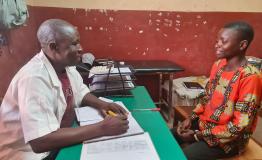
Central African Republic: Living with Diabetes in Carnot
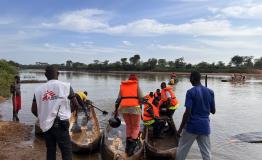
MSF in Batangafo, CAR: Motorbikes, Canoes and Vaccines
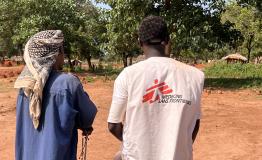
Central African Republic: Difficult access to healthcare for people on the roads around Bambari
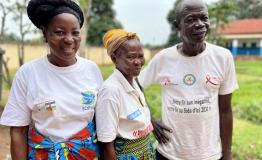
Central African Republic: community aid groups help HIV patients to live openly and confidently
